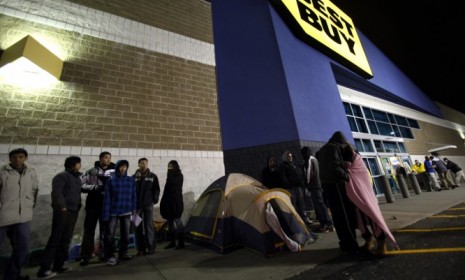Cyber Monday vs. Black Friday: By the numbers
In years past, holiday discount-hunters mobbed stores on Friday and shopped online on Monday — but the distinction between the two days is starting to fade

A free daily email with the biggest news stories of the day – and the best features from TheWeek.com
You are now subscribed
Your newsletter sign-up was successful
For hordes of dedicated bargain hunters, getting up early to deal hunt on Black Friday is as much a holiday tradition as turkey and family dysfunction. But reports indicate that in-store sales have been "dreary" in recent years, as holiday shoppers increasingly go online to look for bargains on the day after Thanksgiving and the so-called "Cyber Monday" that follows. (Watch a local report about Target on Black Friday.) Here, a by-the-numbers guide to the evolving holiday-sales adventure:
1869
Year the phrase "Black Friday" was coined; it originally referred to a catastrophic stock market crash
The Week
Escape your echo chamber. Get the facts behind the news, plus analysis from multiple perspectives.

Sign up for The Week's Free Newsletters
From our morning news briefing to a weekly Good News Newsletter, get the best of The Week delivered directly to your inbox.
From our morning news briefing to a weekly Good News Newsletter, get the best of The Week delivered directly to your inbox.
2005
Year the phrase "Cyber Monday" was coined by the National Retail Federation's Shop.org as a "gimmick to jump-start online sales in the holiday season"
$887 million
Online sales revenue generated on Cyber Monday in 2009, a 5 percent increase over the previous year — matching the record for the "heaviest online spending day" ever (December 9, 2008)
A free daily email with the biggest news stories of the day – and the best features from TheWeek.com
$595 million
Online sales revenue generated on Black Friday in 2009, a 10 percent increase over the previous year
$318 million
Online sales revenue generated on Thanksgiving Day itself last year, an 11 percent increase from the previous year
138 million
Number of people who plan to shop in stores this Black Friday weekend, according to a preliminary survey by the National Retail Federation (though more than half say they will wait to see if the price reductions are worth fighting the crowds and cold)
14.3 percent
The amount e-commerce spending is expected to rise this year, as more shoppers shun brick-and-mortar stores and shop online, according to New York's eMarketer research firm
64 percent
Number of U.S. households with broadband access in 2009 according to census data
55 percent
U.S. households with internet access in 2001
Sources: Washington Post (2), PC World, Tech Crunch, comScore, Home Accents Today, PR-USA.net, Digital Trends, Yahoo, New York Times